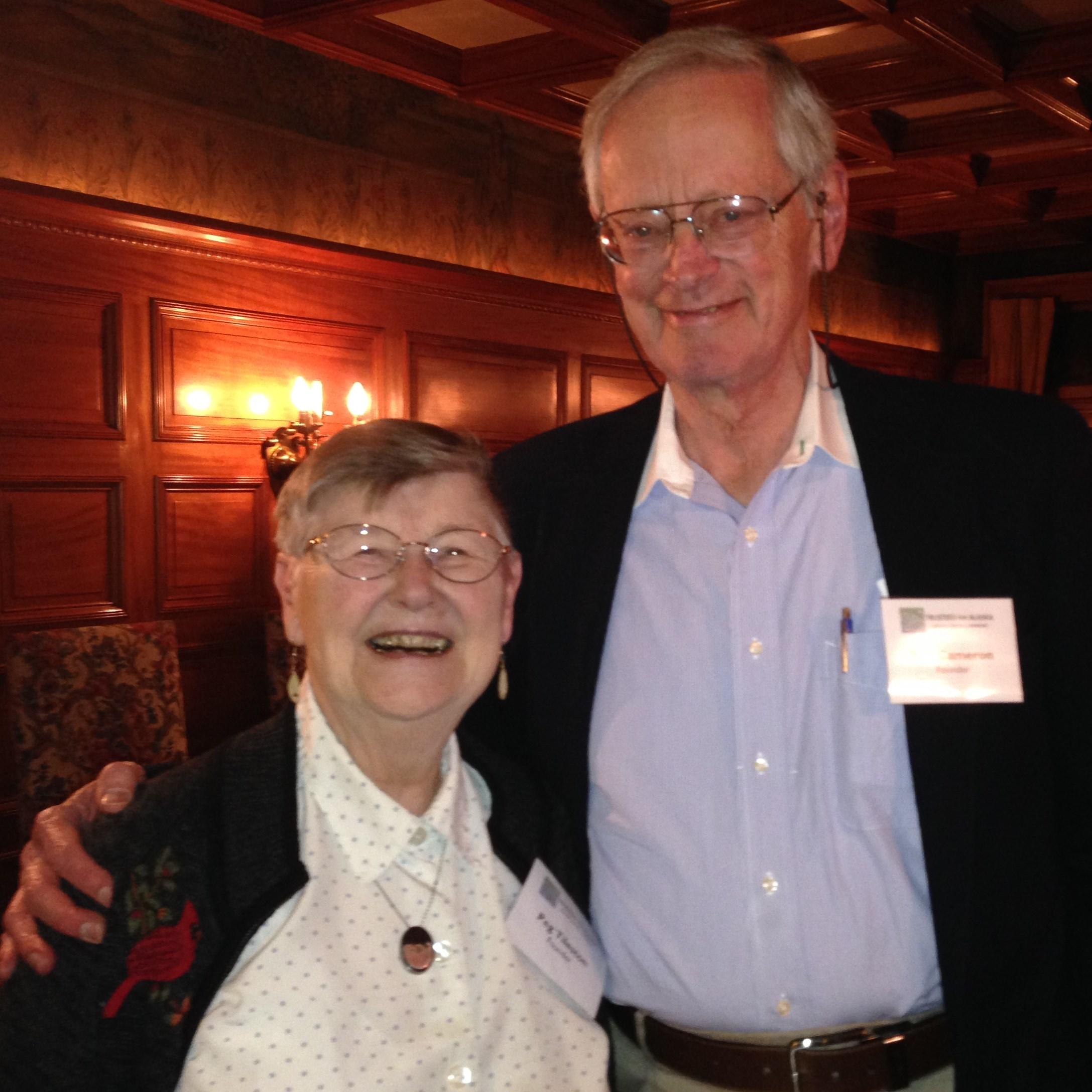
50th Anniversary: Founders Peg and Rod talk about the need, the now, the future
By Dawnell Smith
We’re in our 50th year of holding polluters accountable and protecting Alaska’s water, land, and communities. We want to start our year-long celebration by talking about the people, places, and legal work that defines Trustees’ past and future. This month, we go back to the founders who saw the need for a public interest law firm and made it so.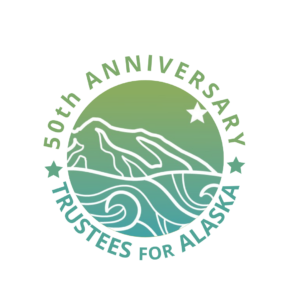
Back in the 1960s, plenty of Alaskans recognized that too many interest groups viewed Alaska as a “resource” to exploit, not a home, and that they needed to head off the harmful consequences of allowing industrialization without guardrails. They recognized the lessons of prior gold rushes, the extraction of animals to near extinction, and all the ways that industrial expansion had taken from the land without caring for its health or that of the many beings and communities who relied on it.
Peg Tileston and Roderick Cameron were two of those people. As a young lawyer, Rod took the lead of the Environmental Defense Fund—a national coalition of lawyers and scientists—in the early 1970s and first engaged on Alaska issues then. Peg came to Alaska in 1972 with her family and immediately got involved in policy issues around protecting the environment, including by helping reorganize the Alaska Center for the Environment in 1974.
At the time, Prudhoe Bay oil had been discovered and an array of oil and gas projects along with the Trans Alaska Pipeline were in play. Peg and Rod recognized the need for legal representation in Alaska—a public interest law firm that represented the interests of clean water, public lands, and all the living beings impacted by extraction projects.
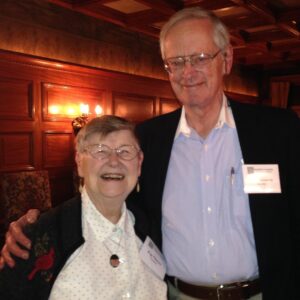
Trustees founders Peg Tileston and Rod Cameron at a 2014 event.
They founded Trustees for Alaska as a nonprofit environmental law firm in December 1974, the same year construction of the Trans Alaska Pipeline began. Rod lives in Seattle now and Peg lives in Anchorage, but they’re forever connected through Trustees and their shared vision.
Below, they share their thoughts about Trustees’ past and future, and what it means to plant the seed for an organization that continues to grow.
What need were you hoping to fill when you founded Trustees, and have those needs been met?
Peg: We knew there was a need for legal representation to protect places in Alaska. The pipeline was being built. There were a lot of oil and gas proposals and activity. People were concerned about water quality. The environmental community and environmental organizations had grown in Alaska, locally and regionally, including the Northern Center and Southeast Alaska Conservation Council, and their scope had expanded. The need for legal representation was becoming obvious. Up to that point, the only representation available was through Sierra Club Legal Defense Fund or pro bono with attorneys already in the state who were willing to spend time on our issues. The need for legal representation in Alaska was clear, and the role of Trustees then and now is to be the preeminent environmental legal organization in the state.
Rod: My first involvement with Alaska was as executive director of the Environmental Defense Fund based in New York. That involvement was in the Trans-Alaska Pipeline litigation, with the Defense Fund as a plaintiff, along with two other environmental organizations, against a consortium of oil companies. Our purposes were 1) to advocate for protection of ecological systems (versus development) in Alaska, and 2) to achieve at least some degree of that protection. My experience with the litigation and with the dedicated Alaskans involved (especially Peg Tileston!), who were determined to protect Alaska, made me realize there needed to be a strong, ongoing, local legal team to advocate for and protect Alaska. I was especially impressed by learning that if Alaska were divided into two equal parts, Texas would become the third largest state in the union. That drove home to me the magnitude of the need, made more critical by the unique environments, risks and opportunities in Alaska.
Trustees has served those goals amazingly well, particularly engaging, coordinating with, and representing many similarly dedicated environmental organizations. However, the needs are often only partially met — and the purposes are likely perpetual!
Has Trustees evolved in ways you didn’t expect?
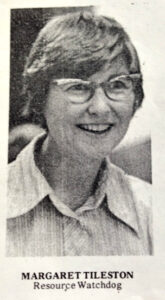
Peg, circa 1974, when she worked to establish Trustees for Alaska.
Rod: Trustees has survived and evolved beyond my hopes and expectations. Trustees’ growth, fundraising, and successes are thanks to the outstanding leadership and staff over the years.
Peg: For many years, the financial situation for Trustees was hand-to-mouth. The support that donors and a healthy financial footing has brought to the organization has really been instrumental to its effectiveness and ability to draw a marvelous staff and to sustain its support mechanisms.
What are a few things about Trustees and its accomplishments that you’re really proud of?
Peg: I think our work with local Alaska Native communities to address Alaska land issues has been incredibly important. Our work on Pebble has been a major achievement. The ability to keep a thump on the oil and gas industry over the years has been vital. Trustees works to make sure that the oil and gas industry abides by federal laws. It has also tried to ensure that the state is responsible to the law. All the puzzle pieces must come together to protect places. Trustees has always understood and played a profoundly important role.
Rod: I am proud of Trustees’ success in helping Alaska residents be more aware of, and governments be more responsive to, the fragility of the ecosystems of Alaska. I am also gratified by Trustees’ reliable engagement with (and ability to gain strength from) other environmental organizations, Alaskans, and Alaska Native communities.
How does it feel to have founded an organization that’s grown and is still effectively doing the work 50 years later?
Rod: I am grateful to have been part of addressing the need when I did, but frustrated that it had not happened earlier.
Peg: It is the primary light, as far as I’m concerned. If I had to pick one organization that’s the light of my life, it would be Trustees for Alaska.
What are your hopes for Trustees and its work in Alaska in the next 50 years?
Peg: Trustees has to continue being a vital, functioning organization. Trustees has to keep going to court, keep negotiating for protections, continue to be a savvy, effective legal organization. That means having financial support and making sure people know what Trustees does. I hope for all of that.
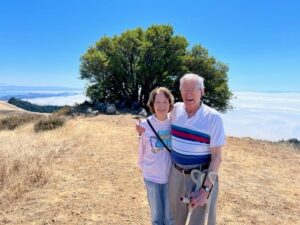
Heather Howard and Rod Cameron in Mount Tamalpais State Park, California, August 2023. Photo by son Colin Cameron
One of the problems we’ve had as a small nonprofit is not being able to pay the wages environmental attorneys from larger firms and outside the nonprofit world get paid. One thing that’s happened is that our light has gotten out from under a bush, and Trustees has been recognized as an important legal organization. This is so important to getting really good attorneys to consider working for us.
I also hope at some point that Trustees can do more legal education in the environmental community. New people in environmental organizations may not understand the importance of the Alaska National Interest Lands Conservation Act and land issues in Alaska. Trustees would be the right organization to fund and hold seminars to help people understand the importance of these issues.
Rod: My fondest hopes are for Trustees for Alaska’s continued informed, forceful, and effective advocacy on behalf of Arctic peoples and the Arctic ecosystem.
Now retired, Rod Cameron was the founder and senior partner of the Cameron Law Office in Seattle. Prior to that, he worked as the executive director of the Environmental Defense Fund and co-founded Trustees for Alaska. Rod has also been on the board and worked a long time with Hanford Challenge to clean up the Hanford nuclear site in eastern Washington and protect workers there. He lives in Seattle with his wife Heather, who also practiced law.
Peg Tileston lives in Anchorage and currently serves on several non-profit boards, including Trustees. She produces and distributes “What’s Up,” an email resource with information on public comment periods, symposiums and conferences, research and grant opportunities, jobs, events, and other related conservation news. She also helped found other organizations like Alaska Common Ground, the Alaska Conservation Foundation, and the Alaska Women’s Environmental Network. She received an Honorary Doctor of Law Degree from the University of Alaska Anchorage in 2009


